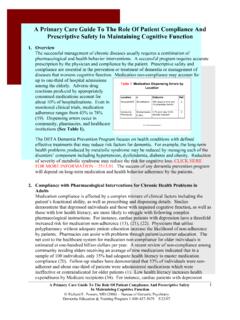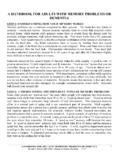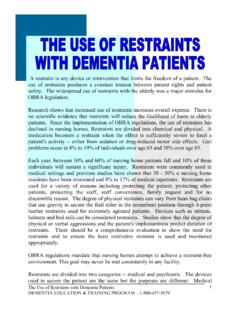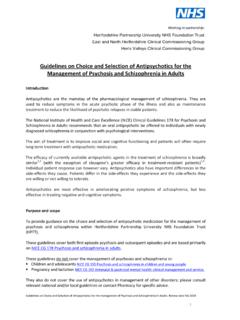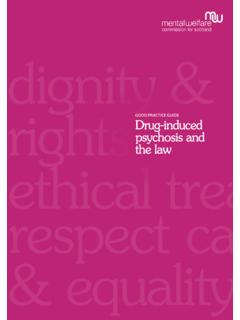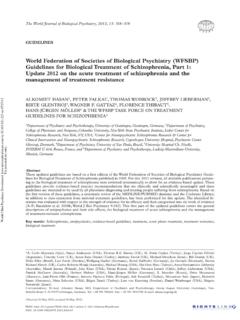Transcription of Assessment and Management of Schizophrenia in …
1 Comprehensive Assessment And Management Of Schizophrenia In The Elderly Schizophrenia is a chronic neuropsychiatric disorder that produces psychotic, negative and disorganized symptoms. Psychotic and disorganized symptoms are grouped together as positive symptoms. Negative symptoms include apathy, affective blunting, and ambivalence. Schizophrenia appears in the late teens or early twenties when the brain undergoes the final phase of development. Elderly patients with chronic Schizophrenia now survive into the seventh or eighth decade I. SYMPTOMS IN ELDERLY. SCHIZOPHRENIC PATIENTS. of life presenting special diagnostic and therapeutic challenges to clinicians. Although Schizophrenia rarely 90%- Auditory begins after age 45, some schizophrenic patients do not Hallucinations require hospitalization until age 50 to 60 (13%) or later (10%).
2 The new onset psychotic symptoms in an elderly patient are 30-40%- Thought more frequently a manifestation of dementia, delirium Insertion psychotic mood disorder, or substance abuse. Delusional 50-60% - Thought disorders are also uncommon in the elderly. A very small Disorder number of patients develop Schizophrenia after age 50 ( , paraphrenia). Classic concepts of Schizophrenia describe a relentless downhill course referred to as dementia praecox. Recent studies indicate that negative symptoms plateau at age 40 to 60 in many schizophrenics (Table 1). Positive symptoms persist into later life and require sustained therapy. Patients continue to manifest Schneiderian symptoms including auditory hallucinations II. CAUSES OF RELAPSE IN. classic ELDERLY.
3 (90-100%), thought insertion or deletion (30-40%), thought SCHIZOPHRENICS. disorder (50-60%), paranoid ideation and delusions (90-100%). Medication Non- Older patients frequently conceal the presence of positive Compliance symptoms due to concern over medications and hospitalization. Caregiver Death Negative symptoms , social isolation, and anhedonia, are New Medical Problems poorly studied in elderly schizophrenics, Depression 1. COMPREHENSIVE Assessment AND Management OF Schizophrenia IN THE ELDERLY. Produced by the Dementia Education & Training Program 1-800-457-5679. and may diminish slightly as the patients age. In general, the schizophrenic symptoms in older patients resemble younger individuals. Elderly schizophrenics have four times higher rates of tardive dyskinesia from chronic neuroleptic usage than younger patients.
4 Most elderly schizophrenic patients remain in the community where they live independently, receive care from family, or reside in group homes, and other community-based institutional settings. Clinical differences between elderly male and female schizophrenics are unknown. Active symptoms persist beyond age 85; however, clinical descriptions are rare for very old schizophrenics. Elderly schizophrenic patients rarely begin to manifest new deficit or negative symptoms in late life, ( , incontinence or refusal to eat) unless new medical or neurological problems occur. A biomedical- psychosocial approach is necessary to maintain elderly patients in the community. Elderly chronic schizophrenic patients with major relapses or new hospitalization need careful evaluation to determine the cause.
5 Schizophrenic symptoms tend to remain stable although relapse on medication occurs in the elderly (Table 2). Medication non-compliance is a common reason that explains why older schizophrenics manifest symptoms. Elderly patients can cheek medications and a past history of non-compliance or paranoia about medication should alert the treatment team to perform mouth-cheeks. Patients can be switched to liquid or given depot preparations. Non-compliant patients may refuse to take medication, change physicians, or undergo programmed dose reductions as part of OBRA. compliance in nursing homes. Some patients have drug discontinuation as a result of medical problems or perceived medication side effects. Patients receiving lower doses of antipsychotic medications may exhibit old symptoms, new psychiatric symptoms, or evidence of break-through dyskinesia.
6 The clinician can restart the antipsychotic medication at previous or slightly higher dosages. Clinicians should restart previous effective medications at comparable dosages and wait several months to determine efficacy. Patients who fail to respond to one or two months of the previous antipsychotic can have medications changed. Most patients improve with consistent therapy and attention to contributing factor such as medical problems. Blood levels will confirm compliance but serum neuroleptic levels do not predict response. Caregiver death is a second common cause of schizophrenic relapse and hospitalizations. Elderly family members who care for elderly schizophrenic's can become incapacitated by medical problems or die. These patients may require several months of active intervention, , COMPREHENSIVE Assessment AND Management OF Schizophrenia IN THE ELDERLY 2.
7 Produced by the Dementia Education & Training Program 1-800-457-5679. partial hospital programs, to assure stability in a new placement, like a group home. Bereavement is poorly described in elderly schizophrenics who will mourn the loss of a spouse or family member. Assessment and Management of medical problems pose a serious obstacle to adequate care of the patient with Schizophrenia . Studies show that primary care doctors miss about one third of health problems in patients with Schizophrenia and psychiatrists miss about one half of medical diagnosis's despite their medical training. Elderly Schizophrenia patients under-report physical symptoms from medical problems and probably comply less than other elders. The chronically mentally ill patient has high rates of substance abuse and cigarettes smoking.
8 Chronic lung disease is common in the elderly schizophrenics because 60% percent of patients have smoked. Psychogenic water drinking persists into old age and may produce edema or abnormalities of electrolytes that primary care doctors will misinterpret as congestive heart failure or renal disease. Typical neuroleptic medication may increases blood glucose levels, although there is no clear association between diabetes and Schizophrenia . Patients with Schizophrenia fail to recognize internal bodily sensations producing anisoagnosia. This syndrome may contribute to underreporting of physical symptoms. The caregiver for the elderly schizophrenic individual should accompany the patient to the physician's office to assist with reporting of symptoms and medication compliance.
9 Physicians should simplify dosing schedules and minimize injectable medications. Caregivers must carefully report all psychoactive medications to primary care doctors because many psychotropic drugs have significant cardiovascular toxicities. Serious new medical problems can destabilize the older schizophrenic patient. Elderly schizophrenic patients may have alteration of their psychotropic drug regimen while hospitalized for medical illnesses. Neuroleptic levels may fluctuate from alteration in drug metabolism induced by new non-psychotropic medications. The stress of hospitalization or surgery can sometimes precipitate psychotic episodes and delirium. Previously stable patients may require weeks or months of active therapy to regain baseline stability through interventions, such as, acute psychiatric hospitalization or long term partial hospital care.
10 Schizophrenic patients can become delirious from medical problems or medications. Delirium may increase positive symptoms and produce behavioral problems, fighting, wandering, COMPREHENSIVE Assessment AND Management OF Schizophrenia IN THE ELDERLY 3. Produced by the Dementia Education & Training Program 1-800-457-5679. incontinence. Management of the underlying medical problems, , UTI or pneumonia improves patient's symptoms. Elderly chronic schizophrenic patients can develop symptoms of depression. The biology and natural history of late-life onset depression in Schizophrenia is unknown. Patients can manifest more negative symptoms and antidepressants may be effective. The decision to treat depression in elderly schizophrenics is based on consideration of the efficacy of antidepressant therapy verses antidepressant side effects.
